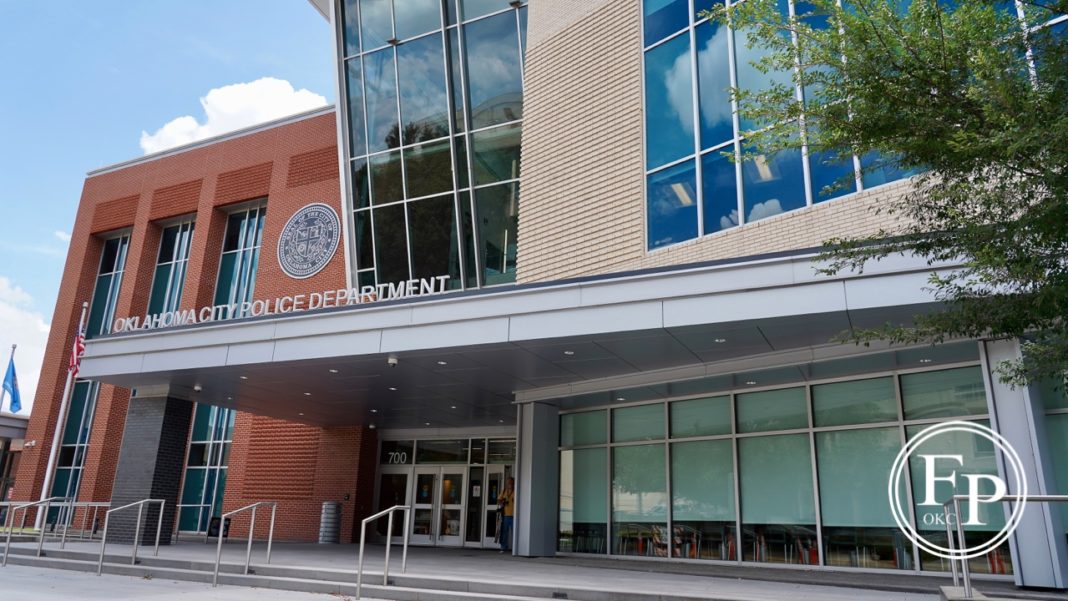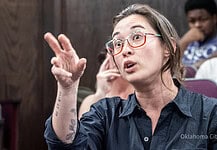Last Updated on January 14, 2021, 9:18 PM | Published: January 14, 2021
On Thursday the Oklahoma City Law Enforcement Policy Task Force met to welcome their newly hired consulting firm 21cp Solutions. The Task Force also heard from a group of members about community-based concerns and suggestions for moving forward.
21cp Solutions
In the last meeting of the City Council of Oklahoma City, the Council voted 5-3 to hire national consulting firm 21cp Solutions. The “cp” stands for “Century Policing.”
Representatives of the firm met virtually with the Task Force on Thursday afternoon to give a brief overview of their framework for consulting on policing policies.
They explained that their work started in President Barack Obama’s Law Enforcement Task Force that was formed in the wake of the killing of Michael Brown at the hands of a Ferguson, Missouri police officer. The often violent clashes that followed Brown’s killing led to Department of Justice inquiries and the formation of Obama’s Task Force.
After the dissolution of the Task Force, several members formed the private company that has now been hired to shepherd Mayor Holt’s Law Enforcement Policy Task Force, formed in the wake of protests of the killing of George Floyd at the hands of Minneapolis, Minnesota police in May.
After Floyd’s killing, people across the world, including in Oklahoma City, gathered in the streets to protest police violence. Local police used “less lethal” means of dispersing crowds of residents in Oklahoma City, such as tear gas and rubber bullets.
The Mayor formed the Task Force as an answer to the call from activists and residents for accountability for the Oklahoma City Police Department.
Phases
21cp representatives explained to the Task Force on Thursday that they work in several phases.
Brian Maxey, former Chief Operating Officer of the Seattle Police Department, explained that the first phase of their work would be to get to know “the lay of the land” in Oklahoma City. He explained that there is often a series of gaps between official policy, what the Police Department intends, and what happens on the ground.
The next phase is to dig deeper into community engagement. They use a community survey for this purpose. 21cp’s practice is to partner with a local organization, preferably an educational organization, for this step. With the involvement of a separate local organization, they can rest assured that the work will continue after the consulting firm is gone.
The company then tries to hear from the community in a more expanded way. They hold meetings with large groups, small groups, and one-on-one in order to get a better idea of what unique needs parts of the community might be experiencing.
After that 21cp makes recommendations.
The final phase is to return to the community and see how their program is working.
Another member of the firm, Ganesha Martin, explained that if not for COVID-19 their firm would already have people on the ground in the communities meeting with people and asking questions.
Martin then asked each non-City-employee to introduce themselves and offer a suggestion for what they want the Task Force to accomplish.
The answer to these questions took well over an hour, with members universally saying they wanted more transparency, accountability, and trust.
Highlighted among the members’ responses was the request for an end to use of lethal force by OKCPD officers.
Community Members
The last part of the meeting was handed over to community members who make up part of the Task Force. A small group of members presented a list of requests for changes to the Task Force.
Member Sarah Adams-Cornell led the discussion, asking first for a rotation of leadership of the meetings between City staff and community members. Adams-Cornell said that many members of the committee felt frustrated about the fashion in which City staff led the meetings, stating that they felt “talked at” rather than being asked for involvement and feedback.
The other requests included a change in meeting time, a thirty minute segment of each meeting for a presentation by a community group about what they expect from the group, inclusion of representation from other communities (including the Autistic, Behavior Health, and Disability communities), reallocation of financial resources to community services like mental health care, and the removal of Fraternal Order of Police leaders Mark Nelson and John George as voting members of the Task Force.
Moderator M.T. Berry said that the Mayor had already approved the rotation of meeting leadership. Berry made clear later that he was not relinquishing his role as the facilitator of the Task Force.
He said the Mayor also agreed that a change in time of the meeting was fine to be considered, as some community members are not able to participate in a meeting in the middle of a workday.
Furthermore, the Mayor approved a rotation of leadership of the meeting, as well as allowing the half-hour for community groups to make a presentation to the Task Force.
Removal of the FOP members as voting members of the Task Force is something that will have to be further discussed among the Task Force and the Mayor.
The Task Force will meet again on February 11 at 1:30 p.m.
Columnist covering local government in Oklahoma City and Oklahoma County from May 2019 through June 2023.










